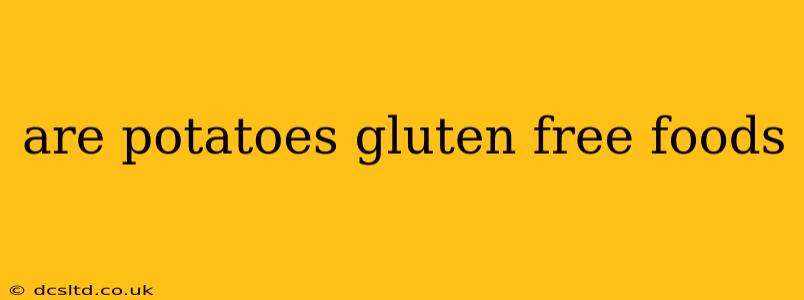Potatoes are a staple in countless cuisines worldwide, beloved for their versatility and nutritional value. But for those following a gluten-free diet, the question of whether potatoes are safe to consume is paramount. The short answer is a resounding yes, potatoes are naturally gluten-free. However, let's delve deeper into this topic to address common concerns and ensure complete understanding.
What is Gluten?
Before we definitively answer the question about potatoes and gluten, it's crucial to understand what gluten actually is. Gluten is a protein composite found in grains like wheat, barley, and rye. It's what gives bread its elasticity and chewy texture. For individuals with celiac disease or non-celiac gluten sensitivity, consuming gluten can trigger a range of adverse reactions, from digestive issues to more severe autoimmune responses. Therefore, avoiding gluten is essential for their well-being.
Are Potatoes Naturally Gluten-Free?
Yes, potatoes are a naturally gluten-free food. They are root vegetables, not grains, and thus do not contain gluten. This makes them a safe and delicious option for individuals adhering to a gluten-free diet. This applies to all types of potatoes, including russet, sweet, red, and Yukon gold potatoes.
How Can Potatoes Become Contaminated with Gluten?
While potatoes themselves are naturally gluten-free, cross-contamination is a significant concern. This can occur during processing, packaging, or preparation. For example:
- Processing Facilities: If potatoes are processed in a facility that also handles wheat or other gluten-containing products, there's a risk of cross-contamination. Look for certifications that ensure gluten-free processing.
- Shared Equipment: Restaurants and food preparation areas might use the same equipment for both gluten-free and gluten-containing dishes. This poses a risk of cross-contamination unless strict cleaning protocols are followed.
- Added Ingredients: Some potato products, such as potato chips or potato salads, may contain added ingredients that contain gluten. Always carefully check ingredient lists.
What About Potato Products? Are They All Gluten-Free?
This is where vigilance is crucial. While the potato itself is naturally gluten-free, many processed potato products might contain added ingredients with gluten. Always read the label carefully and look for certifications if you have concerns. Products to be cautious of include:
- Potato Chips: Some brands might use gluten-containing starches or seasonings.
- Instant Mashed Potatoes: Check the ingredient list for added flours or thickeners.
- Potato-Based Snacks: Many snack foods utilize potato as a base but might include gluten-containing ingredients.
Are Sweet Potatoes Gluten-Free?
Yes, sweet potatoes are also naturally gluten-free. Similar to regular potatoes, cross-contamination during processing or preparation is the primary concern. Always check labels if you are consuming processed sweet potato products.
Can I Eat Potatoes if I Have Celiac Disease?
Yes, potatoes themselves are generally safe for individuals with celiac disease. However, you must be diligent about preventing cross-contamination. This includes ensuring that your cooking utensils and surfaces are thoroughly cleaned and that you choose products explicitly labeled as gluten-free.
Are There Any Other Gluten-Free Root Vegetables?
Besides potatoes and sweet potatoes, other gluten-free root vegetables include carrots, parsnips, beets, turnips, and yams. These offer a variety of flavors and nutritional benefits for a gluten-free diet.
In conclusion, while potatoes are naturally gluten-free, awareness of potential cross-contamination and careful label reading are essential for those on a gluten-free diet. Enjoy the versatility and flavor of this healthy root vegetable with confidence!
